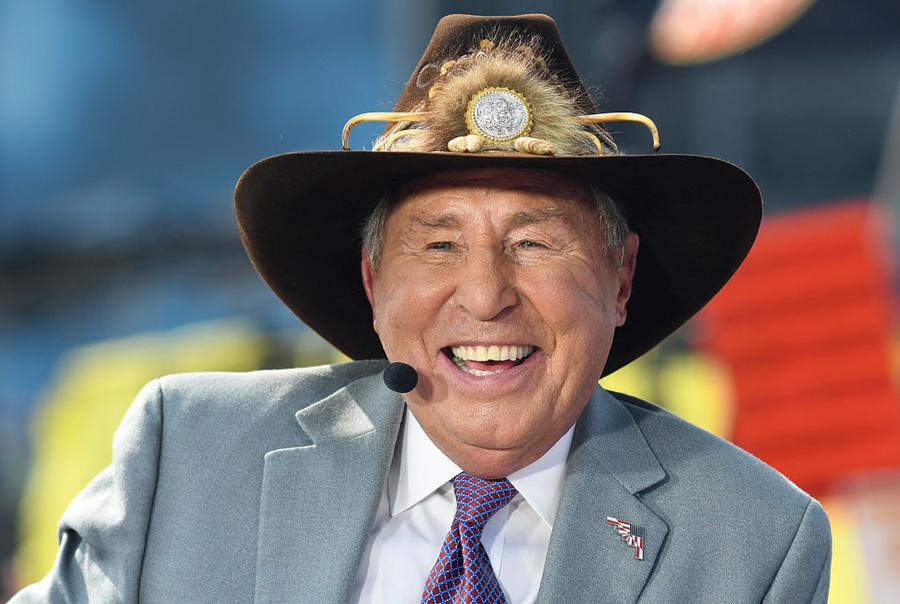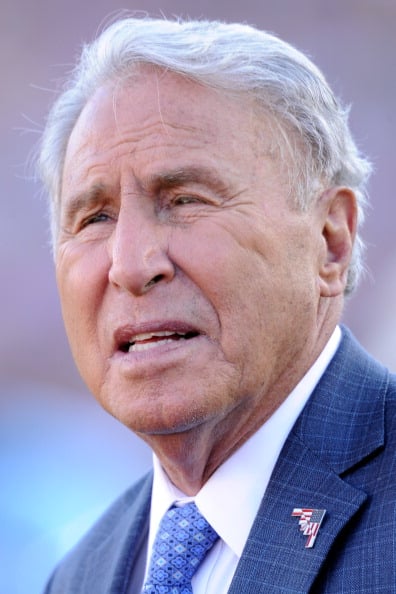What is Lee Corso's net worth?
Lee Corso is an American sports broadcaster who has a net worth of $12 million. Lee Corso is a renowned figure in American college football, best known for his long-standing role as an analyst on ESPN's College GameDay. His career began as a quarterback and defensive back at Florida State University. After graduating, Corso transitioned into coaching, leading teams at Louisville, Indiana, and Northern Illinois.
In 1987, Corso pivoted to broadcasting, joining ESPN as a college football analyst. His charismatic personality and entertaining style quickly made him a fan favorite. Corso's signature moment on College GameDay became his theatrical headgear pick, where he dons the mascot head of the team he predicts will win the featured game.
Throughout his career, Corso has received numerous accolades, including induction into the College Football Hall of Fame as a coach. His catchphrases and energetic presence have made him an iconic figure in college football broadcasting, entertaining and informing fans for decades.
Early Life and Career Beginnings
Lee Richard Corso was born in Illinois on August 7, 1935, to Italian immigrant parents. The family moved to Miami when he was ten years old. He went to Miami Jackson Senior School where he played quarterback. A promising baseball player, he received a $5000 bonus offer to sign with the Brooklyn Dodgers as a shortstop but opted to attend college instead. At Florida State University (FSU) he played baseball and football. Known as the "Sunshine Scooter" for his remarkable speed, Corso set a record with 14 career interceptions which stood way beyond two decades. He was also a member of the Alpha Tau Omega fraternity. Corso graduated from FSU in 1957 with a bachelor's degree in physical education. He also earned a master's degree in administration and supervision in 1958.

(Photo by Michael Shroyer/Getty Images)
Coaching Career
After college, Corso became the quarterbacks coach at Maryland under his former FSU coach. In 1962 Corso opted to recruit an athletically qualified and academically gifted black player, ultimately convincing Darryl Hill to transfer from the Naval Academy. Hence, Darryl became the first African-American football player in the Atlantic Coast Conference.
In 1966 Corso was named head coach at Louisville where he coached his ESPN colleague Tom Jackson. He took Lousiville to just its second-ever bowl game in 1970 before being hired by Indiana in 1972. He then coached Indiana from 1973 to 1982 leading them to win two seasons. The 1979 regular season ended with a 7-4 record, earning a trip to the 1979 Holiday Bowl.
During a game in the 1976 season Corso called a timeout after his team scored an early touchdown in the second quarter. The whole team huddled together for a photo with the scoreboard filling the background. It read "Indiana 7, Ohio State 6." This was the first time in 25 years that the Hoosiers had led the Buckeyes in football. Ohio would win the game 47-7. Corso was fired after ten years with an overall record of 41–68–2.
Corso was also the 16th head football coach at Northern Illinois University and his record was 4–6–1 in his lone season. After his stint in Northern Illinois he made his professional coaching debut for the Orlando Renegades of the USFL (United States Football League) in 1985. While Corso was slated to return to the Renegades in the fall of the following year, the league suspended operations soon before.
Broadcasting Career
In 1987 Corso became an analyst for ESPN's Saturday College GameDay program. He's known for his comedic interactions with co-hosts Rece Davis, Kirk Herbstreit and Desmond Howard, especially when he counters Herbsreit's predictions with his catchphrase "Not so fast, my friend!" His endearing habit of calling almost everyone "sweetheart" adds to his charm. One of the most beloved traditions on College GameDay is Corso's mascot headgear prediction where he picks the featured game's winner by donning the mascot's headpiece. Notable milestones include his 250th headgear pick in 2014 with TCU's Super Super Frog and his 400th with Colorado's Chip the Buffalo in 2023.
Additionally, Corso appeared in a 2006 Nike commercial featuring the fictional Briscoe High School football team along with football stars Deion Sanders and Michael Vick and coaches Jimmy Johnson and Don Shula. In the ad, Corso dramatically removes his hawk mascot head as the game's deciding play unfolds in slow-mo. Besides his television appearance, he was a regular figure in EA Sports' NCAA Football Video Games alongside play-by-play announcer Brad Nessler and Herbsreit until NCAA Football 11.

Kevork Djansezian/Getty Images
Other Works, Charities & Legacy
During the off-season Corso steps into the role of Director of Business Development for Dixon Ticonderoga, a Florida-based manufacturer of office and art supplies. In 2001 Corso even led a project to make a crayon entirely out of soybeans. He also serves as the honorary chairman of Coaches Curing Kids' Cancer, a non-profit that organizes youth sports teams to raise funds for pediatric cancer research. On December 9, 2010 he received the NCFAA's (National College Football Awards Association) Contributions to College Football Award to celebrate his remarkable contributions to college football. He is also proudly listed in the Boys & Girls Clubs of America Alumni Hall of Fame.
Personal Life & Real Estate
Corso has been married to his wife Betsy since 1957 and they have four children and ten grandchildren. On May 16, 2009 he suffered a stroke that led to partial paralysis. He spent three days in intensive care followed by a week in hospital and an extensive rehabilitation period later. Remarkably, he returned to his ESPN College GameDay role for that year's season. While the stroke initially rendered him unable to speak for a whole month, he gradually recovered.
In 1986, Lee and Betsey paid $82,500 for a 1.21-acre property in Lake Mary, Florida. They proceeded to build a 3,000-square-foot lake front home.










 Bengali (BD) ·
Bengali (BD) ·  English (US) ·
English (US) ·